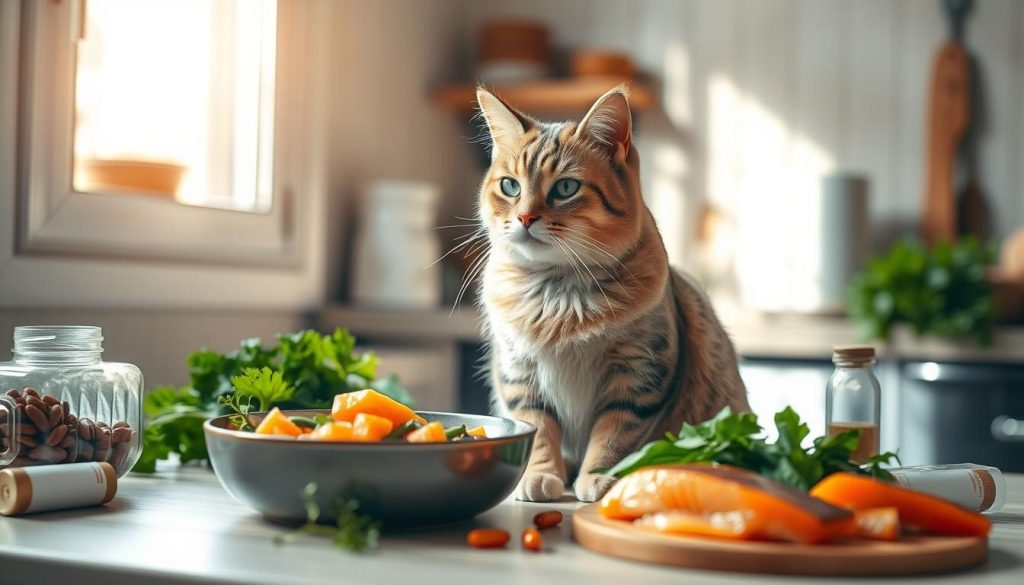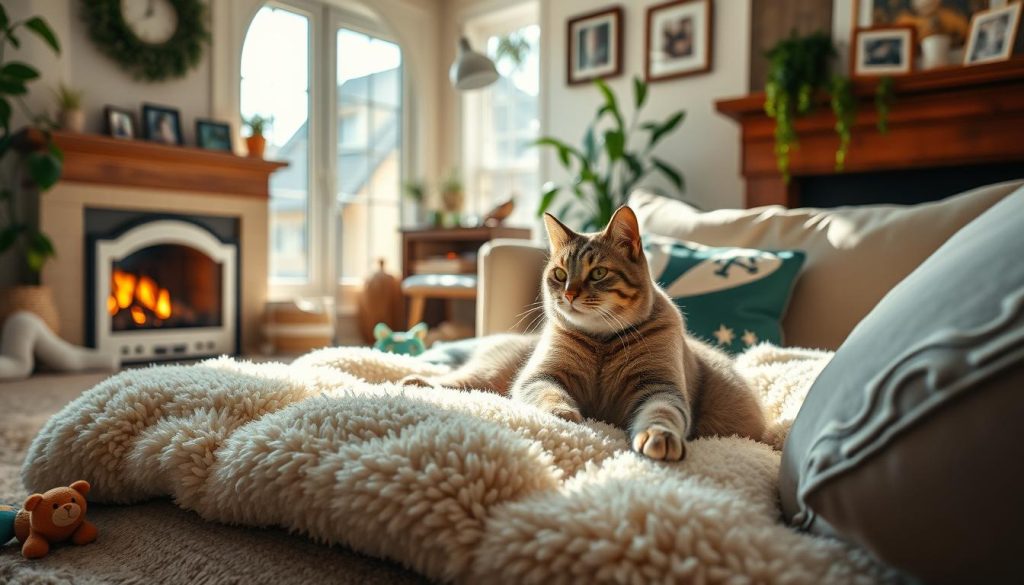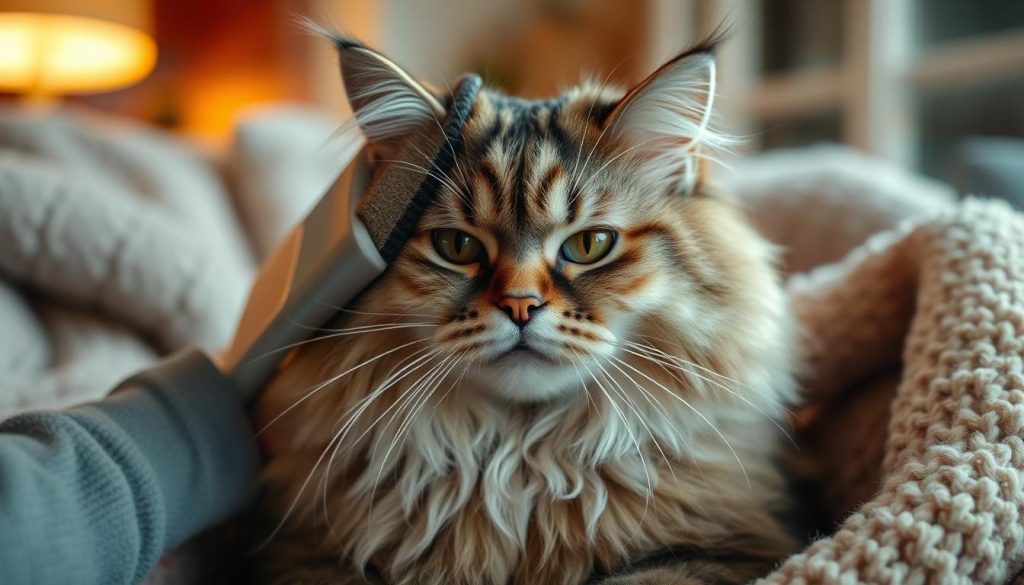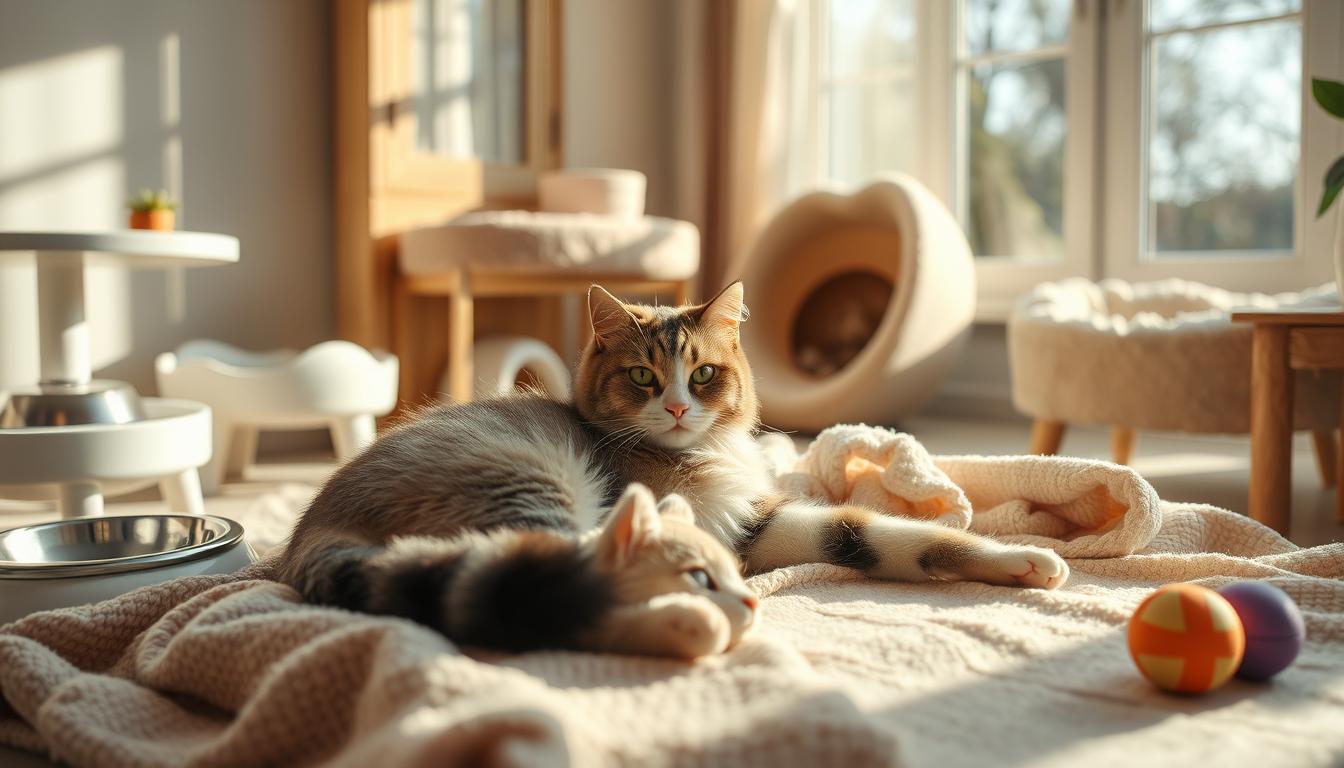As our beloved feline friends grow older, their care needs change. As a devoted pet owner, I know how crucial it is to ensure our senior cats’ health, happiness, and comfort. This guide will offer you key tips and advice for caring for your aging cat.
We’ll cover everything from understanding the aging process to addressing common health issues. By the end of this article, you’ll have the knowledge and resources to give your senior cat the care they deserve.
Whether your cat is starting to show signs of aging or is already a senior, this guide will be very helpful. Let’s start this journey together, making sure your beloved feline lives their later years happily and comfortably.
Understanding the Aging Process in Cats
As our beloved feline friends grow older, it’s key to grasp the aging process. The signs of aging in cats can be subtle. Knowing them helps us care for our senior cats better.
Signs of Aging in Felines
One early sign is a decrease in mobility and flexibility. Senior cats may struggle to jump or climb stairs. Their coat might become dull and dry, and skin health can change.
Behavioral changes are also common. They may sleep more, be less active, and show signs of cognitive decline. This includes disorientation or changes in sleep patterns.
How Aging Affects Different Aspects of Cat Health
The aging process affects a cat’s overall health. Older cats may face health issues like kidney disease, arthritis, or dental problems. It’s vital to be aware of these risks and work with your vet to ensure your senior cat gets the care they need.
Understanding aging signs in cats helps us support them better. We can make their environment more comfortable as they age. This ensures their comfort and well-being in their golden years.
Nutritional Needs for Your Senior Cat

As our feline friends age, their diet needs change. It’s vital to keep their diet balanced for their health. When thinking about senior cat nutrition, there are important things to remember.
Senior cats need more protein in their diet. This helps them keep their muscles strong. It also prevents muscle loss as they get older.
Cat food for older cats should also help with weight management. Some seniors lose weight, while others gain it. Choosing the right food can help keep them healthy.
Drinking enough water is key for dietary requirements for aging cats. Older cats might get dehydrated easily. Make sure they always have clean, fresh water. Adding wet food to their diet can also boost their water intake.
Your vet can help with cat weight management. They can suggest the best cat food for older cats. They might also recommend supplements to ensure your cat gets all the nutrients they need.
Creating a Comfortable Environment for Senior Cat Care

As our feline friends age, we must change our homes to meet their needs. This includes making litter boxes easy to reach, providing cozy spots to rest, and using tools to help with mobility. A senior-friendly home can greatly improve our cats’ lives.
Adjustments for Mobility and Accessibility
Older cats find it hard to jump or climb stairs. To help, install ramps or steps for them to reach their favorite spots. Also, put litter boxes on every floor so they don’t have to travel far.
- Provide ramps or steps to aid in mobility
- Strategically place litter boxes on each floor for easy access
- Install non-slip surfaces to prevent falls and injuries
- Invest in mobility aids such as cat harnesses or slings
Maintaining a Stress-Free Atmosphere
Older cats are more sensitive to changes and stress. To keep them calm, reduce loud noises and sudden movements. Give them cozy spots to rest and consider using pheromone diffusers or calming supplements.
- Reduce loud noises and sudden changes in the home
- Provide a variety of comfortable, familiar resting spots
- Utilize pheromone diffusers or calming supplements
- Maintain a consistent daily routine to minimize stress
By making your home senior cat-friendly, you can help them enjoy their golden years. A well-designed, stress-free space is key to their health and happiness.
Senior Cat Care: Grooming and Hygiene

Keeping your senior cat clean is key to their happiness and health. As cats get older, they might find it hard to groom themselves. It’s up to us to make sure they stay clean and comfortable.
Dealing with Dental Issues
Dental health is very important for older cats. They can get gum disease, lose teeth, and have oral infections. Brushing their teeth, using dental treats, and vet visits can help prevent these problems.
By taking care of your cat’s teeth, you can keep their mouth healthy. This helps avoid pain and other serious issues.
- Brush your senior cat’s teeth regularly using a soft-bristled toothbrush and veterinary-approved toothpaste.
- Provide dental treats and chews to help keep their teeth clean and promote healthy gums.
- Schedule annual veterinary dental cleanings to remove plaque and tartar buildup.
- Monitor for signs of dental problems, such as bad breath, difficulty eating, or red, inflamed gums.
By focusing on grooming and dental care, you can help your cat stay healthy and happy for years to come.
| Grooming Task | Frequency | Importance for Senior Cats |
|---|---|---|
| Brushing | 2-3 times per week | Helps remove loose hair, reduce hairballs, and distribute natural oils for a healthy coat. |
| Nail Trimming | Every 4-6 weeks | Prevents overgrowth and discomfort, especially for senior cats with reduced mobility. |
| Ear Cleaning | Monthly | Helps prevent ear infections and maintain good hygiene for older cats. |
Monitoring Health and Addressing Common Ailments
As my senior cat ages, it’s vital to watch their health closely. Arthritis is a common issue in older cats, causing pain and stiffness. I’ll look for signs like less activity, not wanting to jump, or trouble climbing stairs.
I’ll work with my vet to find ways to ease their pain. We’ll also make changes to their living space to help them move better.
Kidney disease is another big problem for senior cats. It can make them dehydrated, lose their appetite, and face other serious issues. Regular vet visits and blood tests will help keep an eye on their kidneys.
If needed, my vet might suggest special food or medicine to help their kidneys. I’ll also watch for signs of cognitive decline, like getting lost, sleeping too much, or not wanting to play.
Regular vet visits are key to keeping my senior cat healthy. I’ll make sure to schedule check-ups to catch any health problems early. Working with my vet, we’ll make sure my cat gets the care they need to live a happy life.

